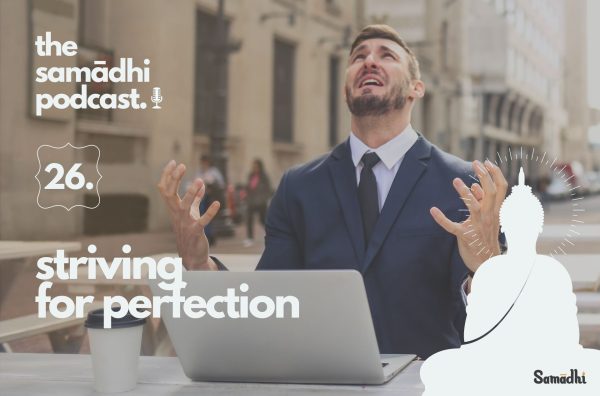- David Oromith
- Season 1
- Episode 26
Inspired by a post on social media, in this episode, David talks about the elusive concept of perfection. By always striving for things to be perfect, we place a great deal of pressure on our self, others and the world around us and bring about our own disappointment and frustration with life.
Transcript
I came across a post on social media the other day. It was a lady talking about her experience of perfectionism, trying to live up to perfect standards, and how that had affected her life.
She said that for a long time, she was trying to be perfect at many things. Trying to be a perfect housewife, a perfect mom, she tried to look perfect. Until she came to realise that perfection doesn’t exist. She said that all of us want to ‘own’ this word, because it makes us feel better.
But she pointed out how can we be perfect, when even physically we’re born imperfect. We all have our own quirks. An asymmetric face or eyes. Perhaps we have a weird toe! And so even if went through many plastic surgeries, corrective surgery, we’d still never be perfect. Because of course it’s subjective, isn’t it.
And she said, ok, what about being perfect at something? A particular skill? Is that possible? And of course, that’s subjective too. For one person, this would be perfect, and for another it wouldn’t.
And she ended by saying that perfectionism is just pressure. And there is so much insight in this post and I loved reading it, because it is so true.
We’re always striving for perfection, the perfect things in life, the perfect job, the perfect partner. The dog, the phone, the car. We don’t want a sub-standard meal or a sub-standard holiday, we want the perfect meal don’t we, and the perfect holiday. It has to be idea, amazing, otherwise it’s not worth striving for.
But as this lady quite rightly says, striving for perfection means putting pressure on ourself to be the best, to achieve the most, to not fail, to never disappoint anyone. And that’s a recipe for disaster, because we set such high expectations and it’s just not realistic.
Of course, they’ll be times where we could ‘fail’ or we don’t quite succeed the way we wanted to. That’s life, that’s natural. And of course, we will, occasion, disappoint others. And that’s a given because people also set expectations that can’t be met. The striving for perfection also means putting pressure on others, for our partner to make us happy, our colleagues to do a great job, our manager to respect us, our neighbours to be very nice and kind. And that’s also a recipe for disaster.
Because one, just like for ourself, our standards for others can be far too high. And we don’t just set the standard, we expect them to reach it as well. And two, half the time we don’t even verbalise what our expectations are. You know, I see so many people, couples, disappointed by what their partner did or didn’t do. When they didn’t even communicate their expectations in the first place. And we’ve all been guilty of that.
It’s also unrealistic to expect people should even meet our expectations of them. Why should our manager, our colleagues, our family or even our partner do the things we want them to do? They all have free will; they have their own life. It also puts pressure on the internal world, doesn’t it. The house, the phone, the car. It sets that expectation – I will be happy as long as things are going well. As long as my plans go smoothly, as long as my phone gives me pleasure, my possessions bring me joy and if they don’t – well, I’ll be disappointed, I’ll want something new, I’ll be bored, I’ll move on.
This way of being, though it feels like a striving, like moving in the direction of improvement, it’s actually quite disempowering. It’s putting a set of requirements for us to be happy out there in the world. You know these set requirements that if they are not met, we won’t be happy. I’ll be happy if these things go my way; if these things are satisfactory, if they are perfect.
We come back to the Buddha’s first of the four noble truths. The truth of suffering, dukkha. With this the Buddha is saying that things of this world are by nature unsatisfactory. And why are they unsatisfactory? Because we view them as sources of our joy and happiness, contentment, fulfilment. We view them as sources of satisfaction from their own side, completely independent of us. We see a lack of happiness, joy, fulfilment, and contentment on our side. We see that’s missing. And we think I need that thing, that person, that place to give me what’s missing inside. When in fact they are just things. And they’re not sources of joy and happiness from their own side, otherwise everyone would see them in the exact same way.
It’s our way of viewing our external world, seeing it as this is a true source of happiness, this is a true source of problems, it’s this labelling that causes us pain and suffering. And sure, of course, we get some joy and pleasure from the outside world, absolutely. The Buddha never denied that and that’s not what he was saying.
But what he did say, and what many contemplatives have discovered since, is that the pleasure to be found here is one of two types. This pleasure is by nature unsatisfactory, that is, that it doesn’t last. You know, getting that great partner, that great thing, it doesn’t last. It doesn’t satisfy, long term. It’s not long before we’re bored and moving on. It’s also by nature competitive. If there’s one person who has more money, more food then generally someone else has less. We see this especially in the modern world. I think the top 8 richest people have the same amount of wealth as something like the poorest 8 and a half billion people in the world. So, it’s by nature competitive. Generally, if one person has more, someone has less. It also can’t protect us from a bad mood or negative thinking. You know, if we are having a bad day, if things are going wrong, then our really nice phone or even a really nice meal, a good time out, cannot protect us from that challenging mind.
They are also impermanent. They are changing, from moment to moment. And they can’t be relied upon.
But there is a second type of pleasure. It’s what we could call genuine happiness and this comes from within. This is more of an inner quality. This is a quality of inner contentment and joy that doesn’t need things outside of us to be perfect, but is naturally calm, joyful. Things can be substandard in life, but it doesn’t matter. We can just enjoy them, we can be at peace, because we bring that to the world. We don’t expect it from outside.
I say, do what you enjoy. Connect with your inner self. Instead of trying to be perfect, instead of trying to reach this illusive concept of perfection, just do what makes your heart sing.
If you like to draw, draw. It doesn’t have to look good. If you like to sing, sing. It doesn’t have to sound good. Since when did singing, drawing, playing music or writing become something only professionals or the naturally gifted could do?
If you love it, do it. After all, there’s no such thing as perfect anyway.
Transcript by: Carol Conzelmann
Listen now on your favourite app...
What is the Samadhi Podcast?
The Samadhi Podcast is a series of bitesize talks and guided meditations that help you become a happier, more peaceful and positive person. Learn how to calm the mind, deeply relax, gain control of feelings and emotions, find inner strength, and let go of negative states of mind such as stress and anxiety by developing a positive approach to life.

